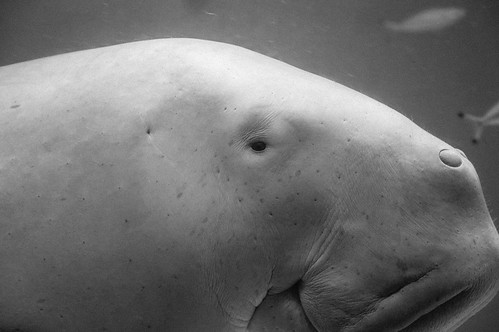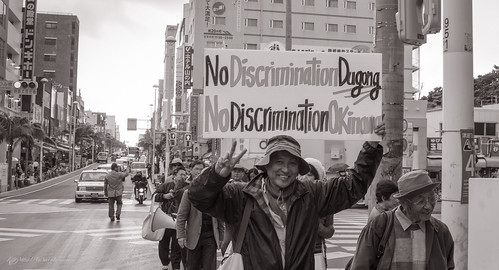7月31日,美日保育團體向美國舊金山法院提出訴訟案,要求日本沖繩的美國軍方暫停興建簡易軍用機場,因為相關工程將在瀕危儒艮的僅存棲地上鋪路。
美國海軍陸戰隊正在沖繩邊野古灣(Henoko Bay)擴建空軍基地,初期的基地興建工程已於今年稍早開始,而保育團體此次的訴訟,只是長久爭議與抗戰的一部份。
此次訴訟目的是要求美國國防部針對如何避免或減輕機場擴張對沖繩儒艮的傷害,進行深入分析,而且在此之前暫停簡易機場興建工程。
美國國防部今年7月下結論認定其擴建活動不會傷害儒艮,但原告保育團體認為,國防部的分析並未考量新機場的所有可能效應、忽略重要事實且排除公眾聲音,包括當地儒艮專家的建言。
儘管最保守的估計都指出儒艮族群極度瀕危,美國國防部也承認其研究資料「不充分」,國防部仍核准了新基地的興建。
儒艮是海洋哺乳動物海牛的近緣物種,也是備受沖繩原住民尊崇的神聖動物。儒艮被日本環境省列為「極度瀕危」動物,同時也在美國的瀕危動物名單上。1997年全世界大約只剩50隻沖繩儒艮;近期的調查估計只能下結論有超過3隻。
等同美國國家歷史保護法的日本文化資產保護法,將儒艮列為重要國家文化意義象徵物之一。根據美國國家歷史保護法和國際法,美國必須考量其行為的後果,且應避免或設法減輕對其他國家文化意義象徵地物造成的傷害。
根據日本自然保護協會調查,新基地周圍有超過110個地點是儒艮今年春夏覓食海草的地點。沖繩島已有20%被美國軍方佔領,多年來許多當地人抗議沖繩基地擴建計劃。
American and Japanese conservation groups have asked a U.S. federal court to halt construction of a U.S. military airstrip in Okinawa, Japan that would pave over some of the last remaining habitat for endangered Okinawa dugongs, marine mammals related to manatees that have long been revered by native Okinawans.
The lawsuit, filed July 31 in U.S. District Court in San Francisco, is part of a long-running controversy over the expansion of a U.S. Marine air base at Okinawa’s Henoko Bay.
Preliminary construction on the base began earlier this year.
The lawsuit seeks to require the U.S. Department of Defense to stop construction on the new airstrip until it conducts an in-depth analysis aimed at avoiding or mitigating harm the expansion will cause to the Okinawa dugong.
In April, the Defense Department concluded that its activities would not harm the dugong, but the plaintiffs claim that conclusion did not consider all possible effects of the new airstrip, ignored important facts, and excluded the public, including local dugong experts.from its analysis.
The dugong is listed as an object of national cultural significance under Japan’s Law for the Protection of Cultural Properties, the equivalent of the U.S. National Historic Protection Act. Under this act and international law, the United States must take into account the effect of its actions and avoid or mitigate any harm to places or things of cultural significance to another country.
The Japanese Ministry of the Environment has listed dugongs as “critically endangered,” and the animals are also on the U.S. endangered species list. In 1997 it was estimated that there may have been as few as 50 Okinawa dugongs left in the world; more recent surveys have only been able to conclude that at least three dugongs remain in Okinawa.
Although the Defense Department acknowledges that this information is “not sufficient,” and despite the precariously low dugong population even under the most conservative estimates, the Defense Department has authorized construction of the new base.
The Nature Conservation Society of Japan reports that it found more than 110 locations around the site of the proposed airstrip where dugongs fed on seagrass this spring and summer.
For years many locals have protested and opposed the base-expansion plan for Okinawa, where 20 percent of the island is already occupied by U.S. military.
※ 全文及圖片詳見:ENS







